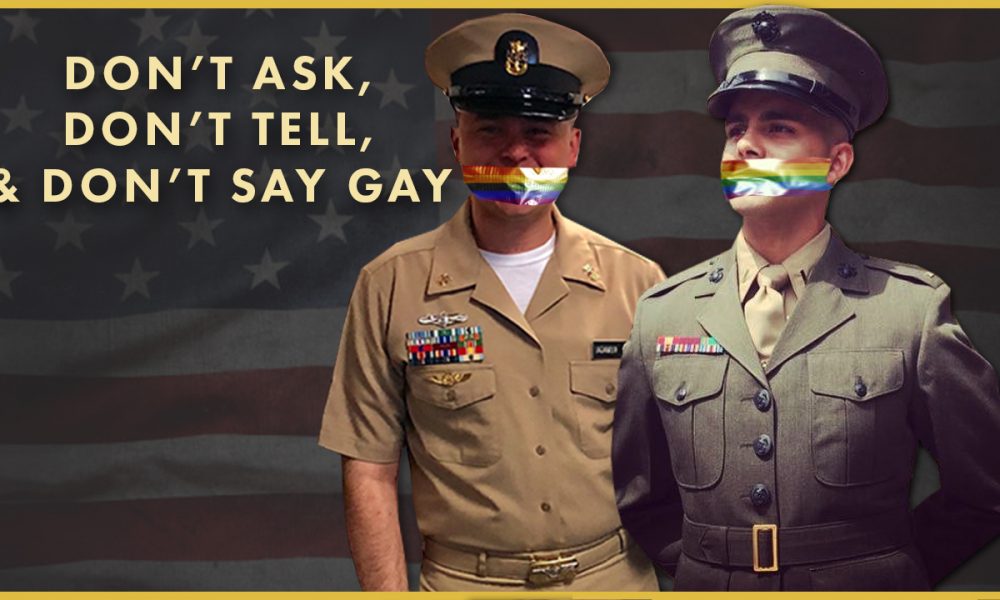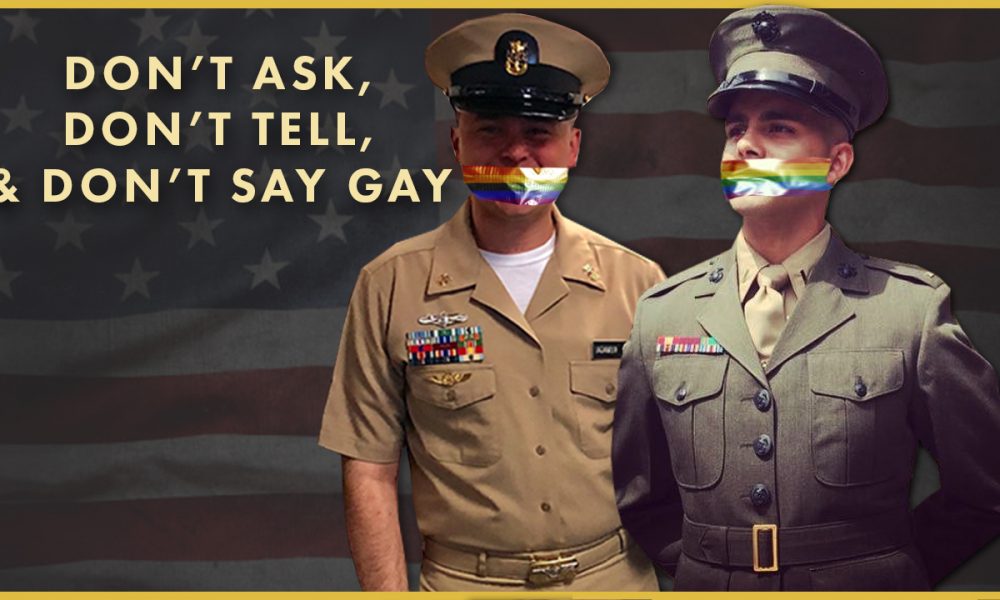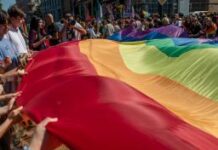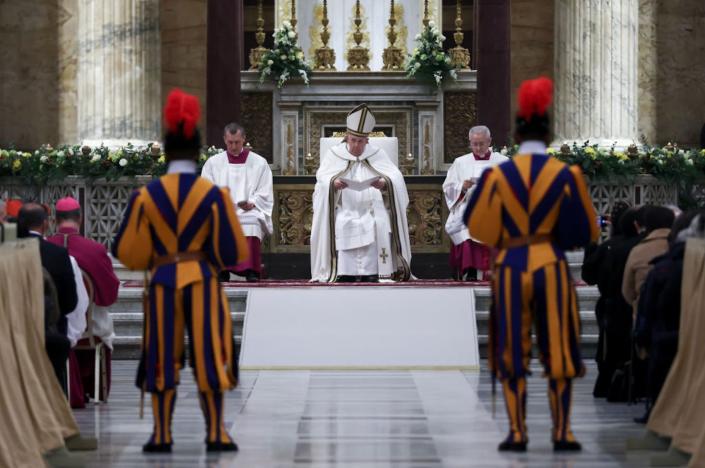
By Karen Ocamb | WEST HOLLYWOOD – There’s an absurd image floating around MAGA Republican social media of a painted pale Donald Trump head plastered on Sylvester Stallone’s shiny buff “Rocky” body with the slogan: “ALPHA MALE.”
After you stop laughing, bear in mind how hard it must be for these Trump fan boys to totally ignore reports that Trump lied about his bone spur (five times) to get medical deferments to avoid military service in Vietnam, according to the Military Times.
Nonetheless, Trump, the rich dilettante, mocked real hero Sen. John McCain, who’d been tortured at the infamous Hanoi Hilton as a prisoner of war, saying he liked people “who weren’t captured.”
During the Trump administration, fake GOP “Alpha Male” myths wound up as policy — such as when Vice President Mike Pence’s suddenly heady evangelical anti-LGBTQ whisperers orchestrated a renewed ban on transgender military service, just as the ban was in its final days of being lifted and patriotic equality implemented.
President Joe Biden lifted the trans ban but if MAGA Republicans win midterm elections on Nov. 8 and take over the House and Senate, there’s good chance we could see an attempt to re-instate Don’t Ask, Don’t Tell or the original ban on LGBTQ service imposed during the 1950s.
Even the debate could dramatically impact LGBTQ lives since the U.S. military is the nation’s largest employer and has been used as a path out of poverty or escape from an abusive homelife.
Furthermore, if a new federal ban was re-instated, questions of LGBTQ identity and military service would revert back to the states regarding employment in the California National Guard. This actually became an issue in California in 1998 when a gay National Guard officer was forced to out himself, was discharged from the US National Guard under Don’t Ask, Don’t Tell (DADT) and sued California, saying DADT violated the California equal protection and free speech clauses. He won.
Democratic Gov. Gray Davis subsequently tried to protect Out California National Guard members from being discharged under DADT if they were federally called up to fight the war in Afghanistan.
This is but one reason why we need Shawn Kumagai and Joseph Rocha in the California State Legislature. Both gay men served in the US military under DADT and know in their core the value of patriotism and how to use brains instead brawn as leadership qualities.
“LGBTQ is on the ballot this year,” says Shawn Kumagai, an out gay candidate for the 20th Assembly District. “I think all of us are feeling just how very important 2022 is. You know, when we see attacks like we saw recently against the Pelosi family – extremism, violence has really gotten out of hand. I’m keeping the Pelosi family in my prayers. It’s just horrific to think that someone can be targeted in that way. You know, I’ve been serving on the Dublin City Council, which is at a much lower level [than Speaker of the House]. I’m also working for a current Assemblymember Rebecca Bauer-Kahan. We get our fair share of concerning comments, phone calls.
“I’ve had people show up to my door, as well,” Kumagai says. “My husband was here and someone came pounding on the door. It is scary. And we have to be vigilant. But I think that this is an underlying sickness that we have in our country — that we’re talking over each other, that we are using one-liners to talk about governance instead of actually talking through and having the tough conversations about where we might disagree. And that’s where I’ve always tried to do my work, even when it comes to LGBTQ issues, is reaching across the aisle talking to people in a reasonable tone and way, try to understand what their concerns are, and try to educate them about what we want as an LGBTQ community. I think we need a lot more of that in our political discourse and a lot less governance by soundbites.
“Things get pretty nasty at the local level and people take it very personally,” says Kumagai. “But I think we can sometimes be seen as easy targets or people will feel like, ‘Hey, I can bully this person because they’re LGBTQ.’ Well, not this LGBTQ. I’m a 21 year veteran of the US Navy. I will not be intimidated by anyone in carrying out and executing my duties as a council member in any of my positions that I raise a right hand and swear an oath to the Constitution that I will protect.”
“Service,” says Kumagai, “is in my DNA. My grandfather served in World War Two in the Army Air Corps. My mom was in the Army Nurse Corps for ten years. And her brother, my uncle was an Air Force Academy grad and flew fighter jets. And I went off and joined the Navy.”
But there was a hitch. “When I sat down to have the conversation with my mom in 2000, 2001, I was an out gay man. I was working at a at a gay bar and restaurant in Phenix, Arizona. It was a deliberate choice to go back into the closet to serve my country. And the ironic thing is — I said, ‘Hey, mom, what’s up with Don’t Ask, Don’t Tell?’ And she had been serving in the Army already. And she said, ‘Well, they can’t ask you and you can’t say anything about your private life, about your sexuality.’ I had met many gay servicemembers who had served before Don’t Ask, Don’t Tell was implemented. And it was even worse. I mean, there were witch hunts. The employees would go into gay bars and search for people who had a military style haircut, pull them out and demand that they show them ID and then process them from for discharge from the military, no matter how much time they had. There were some serious injustices before.
“So, the ironic thing is, at the time, I really viewed Don’t Ask, Don’t Tell as a protection,” he says — that I could serve without undergoing that level of scrutiny. Well, little did I know that — I joined in 2001, which turned out to be the height of discharges under Don’t Ask, Don’t Tell. And after 9/11 happened, the big kind of pushes against Don’t Ask, Don’t Tell is that we saw that a lot of people in the intelligence field were being pushed out for being LGBTQ….I didn’t think it would ever end during my time in the military. And then ten years after I joined, almost like the blink of an eye, it was over and I was able to serve openly with dignity.”
Now Shawn Kumagai wants to bring that experience to the California Assembly. Visit his website, follow him on social media. “And join the team. We are looking to work all the way through 8 p.m. on Election Day, Nov. 8, and we need all the help we can get.”
No doubt Joseph Rocha would say the same. Rocha is running for the California State Senate.
Rocha was born and raised in California, the grandson of Mexican immigrants who worked the fields and factories of Northern California, Woodland and Davis. “So only a few miles away from the Capital that I now aim to serve in,” Rocha says. “That obviously drives my candidacy, my platform. And I am incredibly humbled at the opportunity to serve in the Senate and use that power to help families, give them a lift up and make sure that stories like mine are still possible. So, I am a first-generation community college, college, law school, and officer in the military and both a Navy and a Marine Corps veteran. And yeah, I think that’s a good starting point.”
Rocha was a Navy dog handler. “I served over two years in the Middle East doing explosive detection,” he says. “And then I was discharged under Don’t Ask, Don’t Tell following a series of well-documented abuse. I went on to be in the case that made the entire policy unconstitutional. It’s a little lost in history that there was a legislative push, a vote to repeal Don’t Ask, Don’t Tell that occurred before our case ruling came out, and it failed. After our ruling, it was reintroduced on the House floor and it passed. So I’m definitely very proud to have been part of that incredible timing and push towards a decision that made our military, I think, more in line with its values and certainly our country safer because of it.”
Rocha subsequently went to law school, after which, he returned to military service, earning his commission as a Marine Corps officer. He served seven more years and got out as a prosecutor and a captain.
“Patriotism is what many of us have done a number of times — which is a commitment to the Constitution, Rocha says. “I have sworn an oath to the Constitution as a Navy enlisted sailor, when I entered the bar, as an attorney in California, and when I earned my commission in the Marine Corps. And I hope to do it again if elected to the Senate.
“That’s how you show your patriotism — is to support the system that we have built,” he continues. “And if you can’t earn the support of the people — I mean, this entire system is built on the support of the people. So, if you do not have the support of the people, then you’re not in charge. And you don’t get to take that power by force. And so, these people [insurrectionists] are — they’re criminals. It’s so frustrating. And obviously, there are people on the other side who will challenge my own patriotism or, based on things like supporting a woman’s right to choose, will tell me that I didn’t learn. I didn’t…it’s just you hear every sort of thing. But the point is: I didn’t only serve. I fought to serve.”
Rocha points to the “huge upset” of getting the endorsement of the conservative San Diego Union-Tribune newspaper’s editorial board, which had previously endorsed his opponent in every previous race.
The newspaper said that any charge that the gay candidate “might go up to Sacramento and be a rubber stamp for anyone is just laughable because he stood up to the Navy, the Department of Defense and the Department of Justice to create lasting change,” Rocha notes.
“The reason why I’m sitting here today, aside from a strong public education system, a social safety net and all of those things, but more specifically, as far as my platform goes, is because four years of being asked to turn on the military or to say a single thing negative about our country — and as a much younger guy, 10, 15 years ago with no consultants around me or managers — I was very clear that my fight was with Don’t Ask, Don’t Tell, not what the military or my country and that it was specifically because that policy was at odds with the values of this country. And that’s what guides me today. I mean, there’re things that we can work on to make the country better. But attacking the democratic system or the country itself is not the answer.”
Please watch the Zoom interviews to learn more about these two extraordinary gay men who served our country and now want to serve their districts in the California State Legislature.
The Time is Now | Episode 8
[embedded content]








